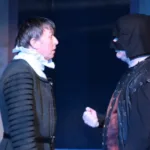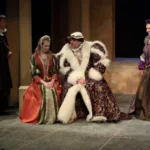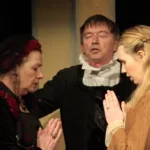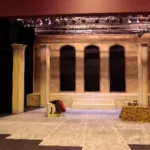Season 65 Play 7 – A Man for All Seasons by Robert Bolt
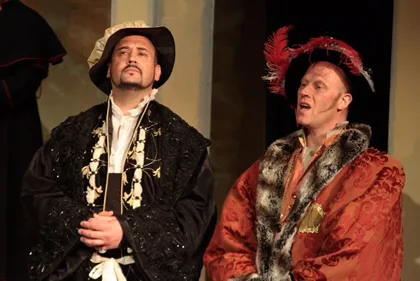
Directed by
Cast
Sir Thomas More – Peter Hall
Master Richard Rich – Rick Hoddy
The Duke of Norfolk – David Thomas
Lady Alice More – Jan Darnbrough
Cardinal Wolsey – Brian Stoner
Lady Margaret More – Rosie Crabb-Wyke
Thomas Cromwell – Jonathan Tate
Signor Chapuys – Gordon Lakin
Chapuy’s attendant – Jack Summers
William Roper – David Pedrick
A Woman – Joann Holbrough
King Henry VIII – Dale Chadwick
Thomas Cranmer – Phil Jordan
Synopsis
The plot is based on the true story of Sir Thomas More, the 16th-century Chancellor of England, who refused to endorse King Henry VIII’s wish to divorce his ageing wife, Catherine of Aragon, who could not bear him a son, so that he could marry Anne Boleyn, the sister of his former mistress.
The play portrays More as a man of principle, envied by rivals such as Thomas Cromwell and loved by the common people and by his family.
This is a powerful classic piece of period drama that demands the same of the performers – strong characters, high intrigue, a true piece of Theatre – one not to be missed
Directors Notes
I can’t help thinking that this is an unusual piece of theatre and from a director’s point of view I have found it challenging. When I first read it I was reminded of the way a Shakespearean play is constructed; lots of scenes following each other fast and furious depicting events in many locations! But that’s where the similarity ends. Next is the historical context; despite historians’ opinions that Bolt glorifies Sir Thomas More and reduces the size of his family – it is based on fact and I believe that the arguments presented are historically accurate. But it seems that the importance of showing the events in sequence and setting out the arguments in ‘courtroom style’ detail have taken precedence over the development of the characters leaving them somewhat two-dimensional. In addition Bolt has chosen to introduce us to The Common Man, a narrator. He plays various small parts throughout the play, you will see him both taking part in the action on stage and commenting on it addressing you directly. The Common Man is a strange and unusual theatrical device, favoured by the German playwright and director, Bertolt Brecht. His role is to disrupt the stage illusion and distance the audience from emotional involvement. Technically he’s there to remind us of the place and influence of the average person in history and prevent the audience from sympathising too much with the titled characters, in this case Sir Thomas More. As a director this gives me a slight problem because I don’t favour the use of this particular technique. Subsequently I have chosen to take some liberties with the role of The Common Man because – to some extent – I do not want to completely break your illusion of being an unseen spectator at an event which is really taking place. In addition – again to some extent – I want you to have some emotional involvement. Whether my approach has been successful and done full justice to this play only you can decide. I hope you enjoy the performance.



